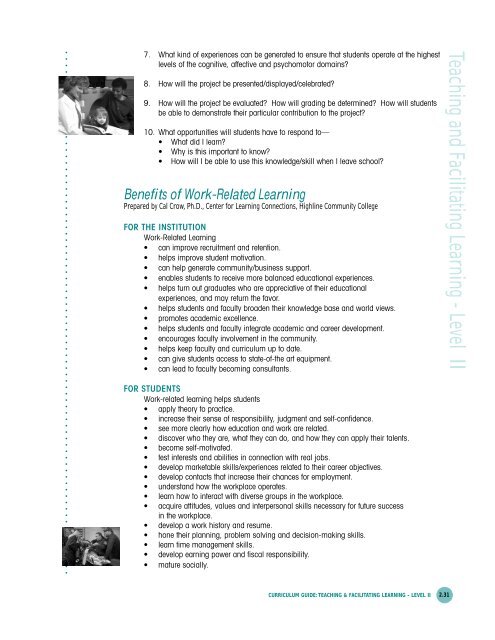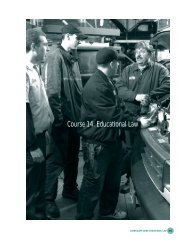Facilitating
Teaching and Facilitating Learning - Level 2 - Washington State ...
Teaching and Facilitating Learning - Level 2 - Washington State ...
- No tags were found...
You also want an ePaper? Increase the reach of your titles
YUMPU automatically turns print PDFs into web optimized ePapers that Google loves.
○ ○ ○ ○ ○ ○ ○ ○ ○ ○ ○ ○ ○ ○ ○ ○ ○ ○ ○ ○ ○ ○ ○ ○ ○ ○ ○ ○ ○ ○ ○ ○ ○ ○ ○ ○ ○ ○ ○ ○ ○ ○ ○ ○ ○ ○ ○ ○ ○ ○ ○ ○ ○ ○ ○ ○ ○ ○ ○ ○ ○ ○ ○ ○ ○ ○ ○ ○ ○ ○ ○ ○ ○ ○ ○ ○ ○ ○ ○ ○ ○ ○Teaching and <strong>Facilitating</strong> Learning - Level II7. What kind of experiences can be generated to ensure that students operate at the highestlevels of the cognitive, affective and psychomotor domains?8. How will the project be presented/displayed/celebrated?9. How will the project be evaluated? How will grading be determined? How will studentsbe able to demonstrate their particular contribution to the project?10. What opportunities will students have to respond to—• What did I learn?• Why is this important to know?• How will I be able to use this knowledge/skill when I leave school?Benefits of Work-Related LearningPrepared by Cal Crow, Ph.D., Center for Learning Connections, Highline Community CollegeFOR THE INSTITUTIONWork-Related Learning• can improve recruitment and retention.• helps improve student motivation.• can help generate community/business support.• enables students to receive more balanced educational experiences.• helps turn out graduates who are appreciative of their educationalexperiences, and may return the favor.• helps students and faculty broaden their knowledge base and world views.• promotes academic excellence.• helps students and faculty integrate academic and career development.• encourages faculty involvement in the community.• helps keep faculty and curriculum up to date.• can give students access to state-of-the art equipment.• can lead to faculty becoming consultants.FOR STUDENTSWork-related learning helps students• apply theory to practice.• increase their sense of responsibility, judgment and self-confidence.• see more clearly how education and work are related.• discover who they are, what they can do, and how they can apply their talents.• become self-motivated.• test interests and abilities in connection with real jobs.• develop marketable skills/experiences related to their career objectives.• develop contacts that increase their chances for employment.• understand how the workplace operates.• learn how to interact with diverse groups in the workplace.• acquire attitudes, values and interpersonal skills necessary for future successin the workplace.• develop a work history and resume.• hone their planning, problem solving and decision-making skills.• learn time management skills.• develop earning power and fiscal responsibility.• mature socially.CURRICULUM GUIDE: TEACHING & FACILITATING LEARNING - LEVEL II 2.31




